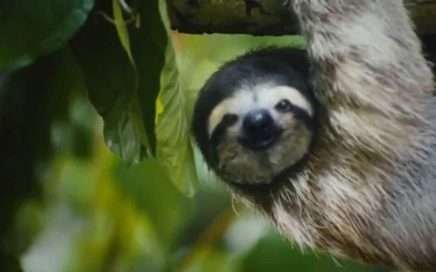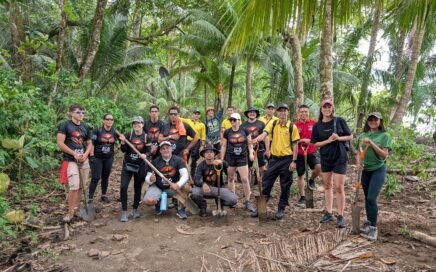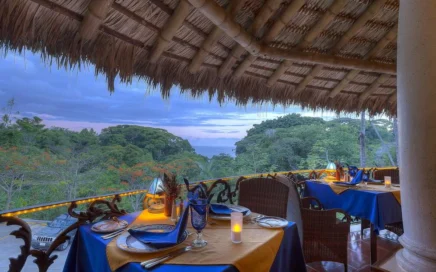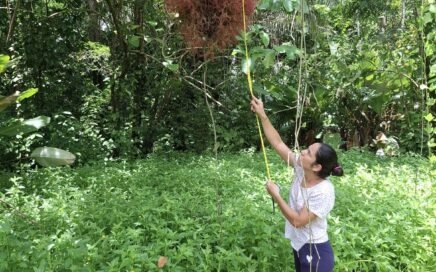A Pond Is a Great Way to Increase Biodiversity
AUTHOR: Coco - The Vegan Pirates
An essential mission of a farm, permaculture, and regenerative agriculture are to attract bees and other insects to guarantee the pollination of fruits and vegetables. To lure in these pollinators and, of course, to increase biodiversity with many different animals like amphibians and birds, amongst others, we have established two ponds on our land.
The larger pond (about 7 x 5 m) is fed primarily with rainwater from the gutters of the house roof and, of course, by direct rain. The other, smaller hillside pond (about 4 x 3 m) is filled with rainwater, which collects along some swales on a more steep part of the property.
Both ponds have a pipe as a drain that prevents overflow and, at the same time, carries large amounts of rainwater along rock swales to other farm areas. The larger pond, in particular, serves as temporary water storage or buffer.
Water hyacinths are the primary plants in the ponds. They are very special plants, versatile, but not without danger because they are considered highly invasive. Therefore, it is essential to have the fast-growing water hyacinth in a controlled environment and by no means introduce it to nature, into a river or lake.

The significant shortcoming of this plant in the wild - namely its fast, uncontrolled growth - is also its greatest advantage. On the one hand, water hyacinths are an excellent storage medium for nitrogen and other destructive substances, making them perfect for treating wastewater. At the same time, they are an ideal material for the compost heap, can be used directly as fertilizer for other plants, or are perfect for biomass or biogas production.
Ponds are cheaper, and the making is a bit easier if you can use clay, but it depends on the availability of a good one. The other solution is cement which holds water even better than clay. If you have red soil, which you can easily find in Costa Rica, mix some fine and dry soil with cement and add water to create your sealing material.
In general, ponds provide a home and both food and water for many animals, which control pests on your crops and plants. They improve productivity and reduce maintenance. By increasing the biodiversity not only attracting bees but also butterflies, moths, dragonflies, many birds, frogs, toads, lizards, and snakes, a pond becomes a great asset and an eye-catcher in your home with a lot of activities, especially in the morning. Some birds love to take baths, and on hot days or during the dry season, all animals can find water to drink there - so it is a big win-win for both nature and humans. Can you dig it?
If you need help in planning and implementing a pond on your yard or property or if you need some water hyacinth plants, let us know!

What to do, Where to eat and Where to stay…
South Pacific Costa Rica Beaches
Looking for business directories, maps or other printouts? We’ve got that too!
Dare to Discover and Enjoy…
Check out…
Need help planning your next trip to Costa Rica? We look forward to help you!
Email: carlos@ballenatales.com
Phone: +(506) 8946 7134 or +(506) 8914 1568
Skype: ballenatalestravel

Busting Myths About Costa Rica Destination, Free Costa Rica Magazine #99
We’ve recently seen misinformation circulating suggesting that Costa Rica is an expensive destination.

Debunking myths about Costa Rica’s South Pacific destination
There is false information circulating that suggests the South Pacific Costa Rica is an expensive destination

Beach Clean Up in Uvita: Community Spirit in Action at Marino Ballena National Park
Beach Clean Up in Uvita Community Spirit in Action at Marino Ballena National Park Author: Sophie Schindler

Costa Rica’s First 100% Gluten-Free Gourmet Restaurant
Costa Rica’s First 100% Gluten-Free Gourmet Restaurant La Palapa Restaurant: Indulgence Without Compromise Travelers come to Costa Rica seeking nature, adventure – and memorable dining. At Cuna del Ángel, a boutique hotel nestled in the […]

Adventure Begins Where Comfort Ends: Our Rain-Soaked Snorkeling Tour to Caño Island
What I Learned from Traveling in the Rain or Why a Plastic Cape Can Teach Humility Our Snorkeling Tour to Caño Island

Increasing Biodiversity in the Path of the Tapir Biological Corridor
The area including the Path of the Tapir Biological Corridor in Costa Rica, is one of the few places with increasing biodiversity.



